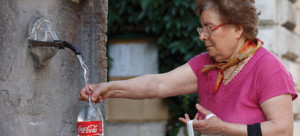by John Thavis
VATICAN CITY (CNS) – A referendum in Italy has spotlighted an emerging social justice issue for the Catholic Church: access to safe water as a basic human right.
Italians went to the polls June 12-13 and voted overwhelmingly to revoke a decree that imposed the privatization of water resources. The issue stirred an unusually intense debate, with church leaders arguing that water is the archetypal “gift from God” that should not be polluted by the profit motive.
The next day, the Vatican’s Cardinal Peter Turkson weighed in. Cardinal Turkson, head of the Pontifical Council for Justice and Peace, said water distribution should be a service provided by governments to their citizens as part of their role in protecting the common good.
Some 25 Italian dioceses signed an appeal asking for a “yes” vote to preserve water as a universally shared resource. Franciscans in Assisi asked prayers and action in defense of “sister water.”
Bishop Mariano Crociata, secretary-general of the Italian bishops’ conference, said recently that access to clean water supplies was a “fundamental human right, connected to the very right to life.” He warned that privatization efforts have seen multinational companies “turn water into business” to the detriment of the wider population.
Catholic lay groups moved into action to promote a high turnout for the referendum, which needed 50 percent of eligible Italians to vote. In the end, that threshold was easily surpassed.
The compulsory privatization of water resources has support in the business community and from the coalition government of Prime Minister Silvio Berlusconi. The question is not as simple as “selling water.” Water supply inevitably involves fees for delivery, but until now prices in Italy have been set by municipalities and publicly owned companies, operating as a public service. Privatization would give companies more freedom to make more profits and, opponents argue, would leave the public at their mercy.
The counterargument is that private businesses would do a much more efficient job of managing water resources, especially in Italy, where corruption and incompetence have left many local systems in disarray. As a newspaper aligned with the Italian Catholic movement Communion and Liberation said, the real enemy in water distribution is waste and inadequate public services, not profits.
Communion and Liberation, however, held a minority opinion in the spectrum of Catholic commentary. Almost unanimously, church leaders in Italy viewed this as a test of whether the concept of “common good” can survive under the rules of free-market capitalism.
At the Vatican, the clean water issue has been on the radar for several years. In 2007, Pope Benedict said he was concerned about the equitable sharing of global water supplies and warned that water shortages could easily become a cause of conflicts.
In a message marking World Water Day a few years ago, the pope said access to safe water was an “inalienable right” that needs to be protected through changes in lifestyle.
The Pontifical Academy of Sciences has hosted scientific study sessions on water, pointing out that 1 billion people lack access to adequate drinking water and that climate changes could aggravate the situation.
The Vatican’s Compendium of the Social Doctrine of the Church underlines that water cannot be treated as just “another commodity among many.” Even when distributed by the private sector, it says, water must be regarded as a public good.
The international community has moved toward recognizing the protection of water supplies. Last July, the United Nations passed a resolution calling on states and international organizations to provide funding and technology, especially to developing countries, to guarantee safe, clean, accessible and affordable drinking water for all.
Practically speaking, that would mean investment in infrastructure for water distribution, especially in places like Africa, where an estimated 50 percent of drinkable water is wasted through leaky conduits or inefficiency.
Last October, Pope Benedict called the U.N. resolution an important step forward. Clean water, he said, was “essential to human nutrition, to rural activities and to the conservation of nature.”
He cited his predecessor, Blessed Pope John Paul II, who said in 2002 that protecting the world’s water supply may require behavioral changes around the world. In other words, water conservation.
The Vatican is sensitive to the water issue for another reason: the 109-acre Vatican City State has no water resources to speak of, and its water is furnished by Italy through a treaty signed more than 90 years ago.
Over the last decade, however, the Italian water company ACEA has tried to collect fees from the Vatican amounting to more than 50 million euros ($73 million). Citing the treaty with Italy, the Vatican has refused to pay, and the Italian state has covered the bill.
Each year, Vatican City consumes about 5 million cubic meters of water, or about 1.3 billion gallons. That may sound like a lot, but not when you consider that Vatican City hosts more than 15,000 visitors and nearly 5,000 employees each day.
The United States consumes about 233 billion gallons of water each year, or 750,000 gallons per person. The U.S. water footprint is about twice as big as the world average.
